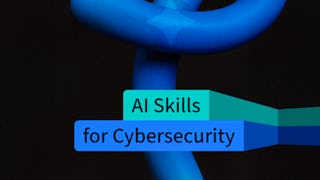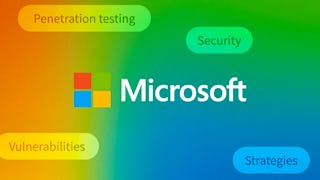Threat Modeling
Filter by
SubjectRequired *
LanguageRequired *
The language used throughout the course, in both instruction and assessments.
Learning ProductRequired *
LevelRequired *
DurationRequired *
SubtitlesRequired *
EducatorRequired *
Results for "threat modeling"
 Status: NewNewStatus: Free TrialFree Trial
Status: NewNewStatus: Free TrialFree TrialSkills you'll gain: Responsible AI, Threat Modeling, Information Systems Security, Security Engineering, Cybersecurity, Information Assurance, Threat Detection, Data Ethics, Artificial Intelligence, Generative AI, Information Privacy, Data Integrity, Data Governance
Beginner · Course · 1 - 4 Weeks
 Status: NewNewG
Status: NewNewGGoogle Cloud
Skills you'll gain: LLM Application, Threat Modeling, Open Web Application Security Project (OWASP), Large Language Modeling, Secure Coding, Security Controls, Security Software, Security Information and Event Management (SIEM), Application Programming Interface (API), System Configuration
Beginner · Course · 1 - 3 Months
 Status: Free TrialFree TrialN
Status: Free TrialFree TrialNNew York University
Skills you'll gain: Security Engineering, Threat Modeling, Distributed Denial-Of-Service (DDoS) Attacks, Cyber Attacks, Cybersecurity, Threat Management, Cyber Risk, Threat Detection, Information Systems Security, Network Security, Computer Security, Exploitation techniques, Encryption
4.7·Rating, 4.7 out of 5 stars2.9K reviewsBeginner · Course · 1 - 4 Weeks

Skills you'll gain: Risk Management, Cyber Risk, Threat Management, Security Management, Vulnerability Management, Risk Mitigation, Cybersecurity, Threat Modeling, Operational Risk, Vulnerability Assessments, Security Controls, Information Technology
Beginner · Course · 1 - 3 Months

Skills you'll gain: Cyber Risk, Risk Management, Threat Management, IT Management, Security Controls, Security Management, Business Risk Management, Vulnerability Assessments, Cyber Security Assessment, Cyber Security Strategy, Cybersecurity, Threat Modeling, Cyber Security Policies, Information Assurance, Data Security, Technical Communication, Stakeholder Communications, Business Communication
Beginner · Course · 1 - 3 Months

Skills you'll gain: Cyber Threat Intelligence, Vulnerability Assessments, Incident Response, Vulnerability Scanning, Cybersecurity, Threat Modeling, Threat Detection, Application Security, Security Management, Intrusion Detection and Prevention, Security Engineering, Security Controls, Malware Protection, Network Analysis
Intermediate · Course · 3 - 6 Months
 U
UUniversity of Maryland, College Park
Skills you'll gain: Usability, Human Computer Interaction, Authentications, Security Engineering, Usability Testing, Interaction Design, Threat Modeling, Human Factors, Information Privacy, Cybersecurity, Personally Identifiable Information, User Interface (UI) Design, User Acceptance Testing (UAT), Multi-Factor Authentication, User Centered Design, Design
4.6·Rating, 4.6 out of 5 stars3.3K reviewsMixed · Course · 1 - 3 Months
 U
UUniversity of Maryland, College Park
Skills you'll gain: Cybersecurity, Cyber Security Policies, Cyber Risk, Risk Management, Cyber Governance, Cyber Attacks, Stakeholder Engagement, Risk Mitigation, Cyber Security Strategy, Stakeholder Communications, Operational Risk, Enterprise Risk Management (ERM), Security Management, Risk Analysis, Cyber Security Assessment, Threat Modeling, Information Assurance, Risk Modeling, Governance, Vulnerability Assessments
Beginner · Course · 1 - 3 Months
 Status: Free TrialFree Trial
Status: Free TrialFree TrialSkills you'll gain: Threat Modeling, Cloud Security, Internet Of Things, Infrastructure Security, Vulnerability Management, Information Systems Security, Incident Response, Identity and Access Management, Security Engineering, Threat Management, Penetration Testing, Network Security, Security Controls, Cloud Computing, Cloud Computing Architecture, Threat Detection, Authentications, Authorization (Computing)
Intermediate · Course · 1 - 4 Weeks
 Status: NewNewG
Status: NewNewGGoogle Cloud
Skills you'll gain: Cyber Threat Intelligence, Threat Detection, Cyber Threat Hunting, Threat Management, Threat Modeling, Incident Response, MITRE ATT&CK Framework, Computer Security Incident Management, Intrusion Detection and Prevention, Security Information and Event Management (SIEM), Google Gemini, Security Strategy, Vulnerability Assessments, Cloud Security, AI Product Strategy, Interactive Data Visualization
Intermediate · Course · 1 - 3 Months
 Status: NewNewG
Status: NewNewGGoogle Cloud
Skills you'll gain: Cyber Threat Hunting, Cyber Threat Intelligence, Threat Detection, Threat Management, Threat Modeling, Incident Response, Endpoint Detection and Response, Computer Security Incident Management, Infrastructure Security, Cloud Security, Interactive Data Visualization, Artificial Intelligence, Graphical Tools
Intermediate · Course · 1 - 3 Months
 U
UUniversity of Maryland, College Park
Skills you'll gain: Hardware Design, Security Engineering, Computer Hardware, Hardware Architecture, Threat Modeling, Threat Detection, Cybersecurity, Vulnerability Assessments, Application Specific Integrated Circuits, Exploit development, Cryptography, Systems Design, Encryption, Exploitation techniques, Technical Design, Emerging Technologies
4.3·Rating, 4.3 out of 5 stars690 reviewsMixed · Course · 1 - 3 Months
Most popular
 Status: Free TrialFree TrialStatus: AI skillsAI skillsG
Status: Free TrialFree TrialStatus: AI skillsAI skillsGGoogle
Build toward a degree
Professional Certificate
 Status: Free TrialFree TrialV
Status: Free TrialFree TrialVVanderbilt University
Specialization
 U
UUniversity of Maryland, College Park
Course
 Status: Free TrialFree Trial
Status: Free TrialFree TrialCourse
Trending now
 Status: Free TrialFree TrialStatus: AI skillsAI skillsG
Status: Free TrialFree TrialStatus: AI skillsAI skillsGGoogle
Build toward a degree
Professional Certificate
 Status: Free TrialFree Trial
Status: Free TrialFree TrialSpecialization
 Status: Free TrialFree TrialV
Status: Free TrialFree TrialVVanderbilt University
Specialization
 Status: Free TrialFree TrialStatus: AI skillsAI skillsM
Status: Free TrialFree TrialStatus: AI skillsAI skillsMMicrosoft
Professional Certificate
New releases
 Status: Free TrialFree TrialM
Status: Free TrialFree TrialMMacquarie University
Course
 P
PPearson
Course
 Status: Free TrialFree TrialE
Status: Free TrialFree TrialEEdureka
Course








